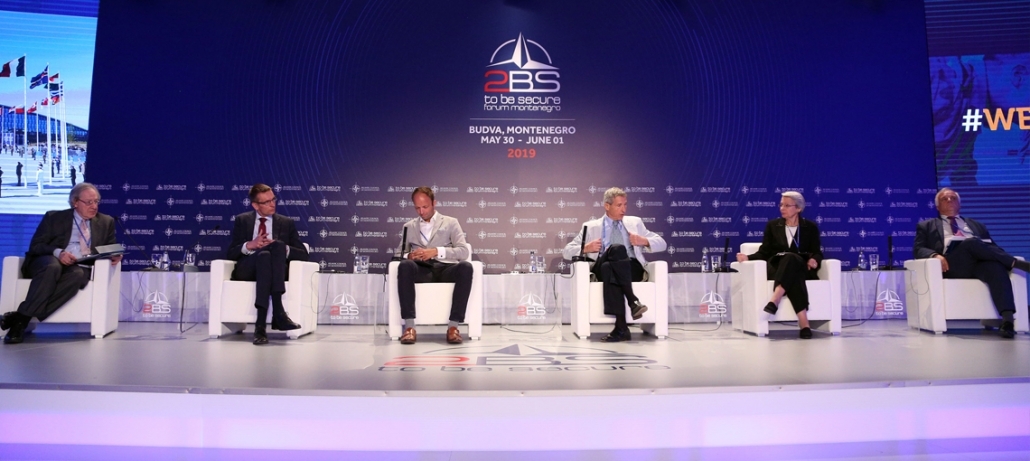THE CONCLUSION OF THE SECOND PANEL OF 2BS FORUM: EUROPE NEEDS NATO ALLIANCE FOR PEACE AND STABILITY ON THE EUROPEAN CONTINENT
Developments in the Balkans show that Europe needs NATO Alliance for peace and stability of the European continent, is one of the messages conveyed during the panel discussion “Security reimagined: Ironclad commitment to the transatlantic alliance put to test“ which took place within the framework of To Be Secure (2BS) Forum in Budva.
During his keynote speech, the Minister of Foreign Affairs, Srđan Darmanović, noted that all the crises in member states are helping them understand that the existence of the Alliance is more important than differences they have in terms of viewpoints.
“The developments in the Balkans show that Europe needs NATO and that NATO is important for the stability of the European continent. That is why we should advocate for more NATO-oriented solutions that will ensure progress in European defence capabilities, but also within the NATO Alliance. If we fulfill the obligations defined in Wales, we are investing in our unity and solidarity” said Darmanović.
Defence spending, as he said, is not only a matter of equitable burden-sharing, but is essentially an issue of credibility and political unity of the Alliance.
“Montenegro, still the newest ally, is currently 13th in the range of expenditures intended for the defence of 29 allies and is fully committed to fullfilling the obligation from Wales until 2024”, stated Darmanović.
In Darmanović’s opinion, NATO today operates in the most complex security environment in its history, countering “more diverse range of threats than ever before, from both east and the south“.
“Growing international assertiveness of Russia, its revisionist policy characterized by agressive actions is one of the most exciting features of the time we live in“, stated Darmanović.
Steven Erlanger, Chief Diplomatic Correspondent in Europe for The New York Times, addressed the earlier statement of the American president, Donald Trump about how Montenegro could start the Third World War, by saying that he has an impression that Montenegrins are very tall and very kind people.
David Konecký, Political Director of the Czech Ministry of Foreign Affairs said that Montenegro achieved remarkable progress.
He thinks that the membership in NATO or the EU is only the beginning.
“NATO has to act for the benefit of every member and I think it does in regard to Russia“,stated Konecký.
Bruno Lété, Senior Fellow from the German Marshall Fund of the United States said that he aways gets astonished by how NATO pays far too little attention to China.
“China is an inevitable factor in European security. It already is in the economic system, China owns roads, ports“, said Lété.
As for Europe, he is of the opinion that the Europeans have not decided on the best model for their security.
Stefano Stefanini, Director of Project Associates’ Brussels Office, stated that the cooperation between NATO and the EU represents an extremely significant issue.
He thinks that reacting collectively on the question of China is not advisable. Speaking of the so-called common European army, he stated that the phrase “European army” should be prohibited.
Judy Ansley, Senior Advisor of the US Atlantic Council’s Future Europe Initiative, highlighted that the enhancement of competitiveness of major powers and Russian activities are the key threat to NATO.
“If we observe the activities performed in the Balkans, such as coup attempt in Montenegro or the developments in Ukraine, we can see that Russia is operating on the ground”. “NATO adapted well to those threats”, she estimated, stating that “we must be aware of the threats and react to them.”
Ansley also said that everyone is finding the capacity to combat hybrid threats within its own country.
When it comes to Russia and Turkey, her greatest concern is Ankara’s purchase of Russian equipment. She highlighted that she is not worried about China’s investments in Europe.
Robert Pszczel, Senior Officer for Russia and the Western Balkans, stated that NATO must adapt.
“If we did not adapt, we would not have a comprehensive cyber crime policy,” he said, adding that awareness of what Russia is doing today has increased.
Referring to the Turkish plans for purchase of Russian S-400 system, he stated that Turkey is a highly valued member of NATO, and that he would feel bad if any bilateral dispute arose.
Commenting on the possible impact of Brexit on NATO, Konecký said that models of cooperation are imaginable in the future, while Stefanini stated that there will be a political influence exerted on NATO.
“The United Kingdom is a bond between Washington and Europe”,said Stefanini.
